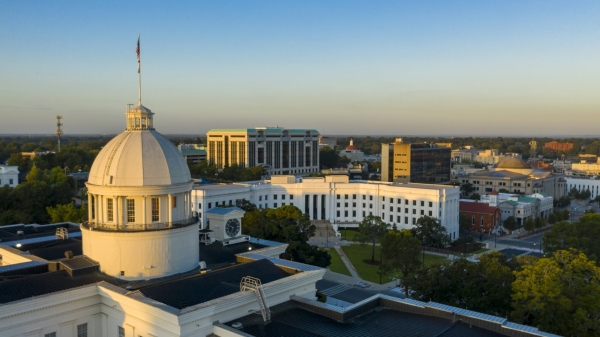When House Republicans recently passed their version of President Trump’s “big beautiful bill,” experts warned that the legislation’s proposed cuts to Medicaid would leave millions of Americans without health care coverage. Now, Senate Republicans are proposing even greater cuts to Medicaid in their version of the bill, threatening to limit provider taxes which help states collect more federal matching funds for the program. The New York Times estimates that the policy could result in funding shortfalls of hundreds of billions of dollars for states over the next decade if implemented.
Members of the Senate GOP are also proposing even greater Medicaid work requirement increases, another policy which would take coverage away from Americans — including many of whom who are, in fact, employed.
The American Hospital Association has already decried these proposals, warning that hospitals across the country will have to cut services or even close their doors if these policies go into effect.
“These harmful proposals will impact access to all patients who are served by our nation’s hospitals and health systems,” Rick Pollack, president of the American Hospital Association, said in a statement Tuesday.
Congressional Democrats are also lambasting the proposed cuts, highlighting how the Republican agenda would devastate rural hospitals and remove millions of Americans’ health care coverage in order to afford greater tax cuts for the wealthy.
“Donald Trump is threatening to unleash a rural health care crisis in America with his billionaire-first budget that will gut Medicaid and cut funding to rural hospitals and nursing homes, ripping lifesaving health care from rural families,” Ken Martin, chair of the Democratic National Committee, said in a recent statement. “Let’s be clear: Our rural hospitals are hanging on by a thread — and Trump and his MAGA lackeys are standing by with scissors to finish the job. Democrats will keep fighting for rural Americans and their way of life, and defend their health care from anyone who wants to take it away.”
For Alabama, one of only 10 states yet to expand Medicaid through the Affordable Care Act, these cuts could pose a uniquely dangerous threat to the state’s rural hospitals which already struggle to stay open.
On Wednesday, APR spoke with Danne Howard, deputy director and chief operating officer of the Alabama Hospital Association, to better understand how these proposed cuts would impact hospitals across Alabama.
Howard began by noting that two of the rural hospitals which Democrats have highlighted as being “at-risk” in Alabama have actually already closed their in-patient services due to financial stresses — emphasizing the strain which the state’s hospitals are already under even before any proposed Medicaid cuts take effect.
“Lawrence Medical Center already closed. It closed last month and it is transitioning to provide outpatient services. The hospital itself closed and they’re going to continue, hopefully, providing care in the community — they’ve affiliated with Huntsville Hospital,” Howard stated. “And Bullock County is also listed in there, and Bullock County converted in the past year to a rural emergency hospital. They also gave up their inpatient beds, and they are a rural emergency hospital only providing hospital emergency department and outpatient services. All of which, for both of those, were because of financial stress.”
Howard went on to detail both the uncertainty that the Republican legislation is causing for Alabama’s hospitals and the harm which the Medicaid cuts would have on the state health care system if implemented.
“We are anxiously watching, waiting, and yes, we’ve had multiple conversations with our delegation and with others,” Howard told APR. “It’s really difficult to react to any particular provision right now until we know what it’s going to look like. I will say this with total confidence: any decrease in Medicaid funding for the state of Alabama would have a huge negative ripple effect, not only for our hospitals, but for every community that we serve.”
“Our hospitals, both rural and urban, are already financially fragile, and [if there are] any cuts to [Medicaid], then I don’t know that the state has the budgetary ability to make it up. So the cost shifting to the state, I don’t know that that’s an option,” she added. “Alabama’s Medicaid program is really a bare-bones program. We don’t cover a lot of services that some other states do, and what that means is that we don’t really have anything to cut in the current program and still be compliant with federal requirements. We’re really nervous about any decreases in funding.”
Howard added that there remains uncertainty as to exactly which proposals would affect Alabama if the Republicans’ bill were to pass in its current form, given that the state has not opted into Medicaid expansion.
“Some of the provisions they’re talking about now are more aimed at expansion states than non-expansion states, but we have a lot of questions about some of the provisions in there. I don’t know that we have a full understanding of how some of those may or may not apply,” Howard noted.
“We are talking with the Medicaid Commissioner, we’re talking with our colleagues in the state and our members and with our delegation to make sure that we are able to get information to them on what the impact would be to Alabama,” she continued. “It’s just that so many things are fluid right now, it’s hard to know what to react to.”
Howard isn’t the only one concerned about how the “big beautiful bill” will affect Alabamians and the state’s hospitals. On Wednesday, U.S. Rep. Terri Sewell, D-Ala., hosted a “Terri Talks” livestream across her social media in which she spoke with Hill Hospital CEO Loretta Wilson about the threat posed to Alabama’s rural hospitals in particular.
“We know that our rural hospitals are already facing unprecedented challenges here in Alabama, but sadly, lawmakers in Washington are making the situation even worse,” Sewell said. “A few weeks ago, House Republicans passed President Trump’s so-called ‘big beautiful bill,’ and that bill gives trillions of dollars in tax breaks to the wealthiest Americans and pays for them by slashing health care and food assistance for our most vulnerable Americans. It is an outrageous attempt to further enrich the billionaire class at the expense of the working people of America.”
Sewell went on to stress how the proposed Medicaid cuts will strip away both vital coverage for the most vulnerable Alabamians and vital funding for the state’s most vulnerable hospitals.
“The bill cuts more than $800 billion in funding for Medicaid. Those cuts would strip nearly 14 million Americans of their health insurance and leave countless others without the food assistance they need,” the congresswoman continued. “We know that Medicaid in Alabama is a lifeline for so many Alabamians, especially our children, our seniors, and the disabled. More than half of all births in Alabama are covered by Medicaid, more than 68 percent of our nursing home patients rely on Medicaid, and more than 20 percent of Medicare beneficiaries rely on Medicaid — the list goes on and on.”
“But Medicaid isn’t just important for individuals, it is also a lifeline for so many of our hospital systems here in Alabama which are struggling to keep their doors open,” Sewell added. “In 2023 alone, Alabama’s hospitals received $3 billion in Medicaid payments. Now, because state officials have refused to expand Medicaid, Alabama already has a bare-bone minimum Medicaid program which has only been exacerbated by the closure of rural hospitals throughout our state. But if Republicans in Congress are successful in passing Trump’s ‘big ugly bill,’ as I call it, our remaining rural hospitals here in Alabama will be forced to eliminate essential services, or even close their doors altogether.”

















































